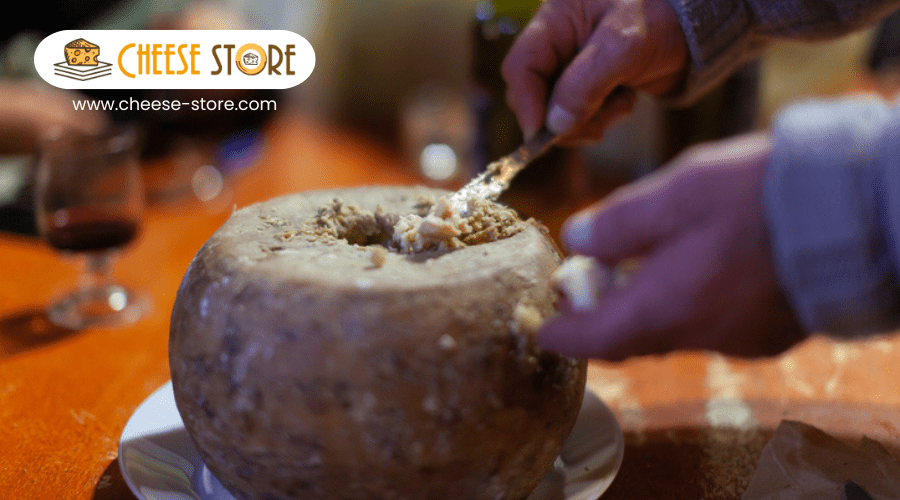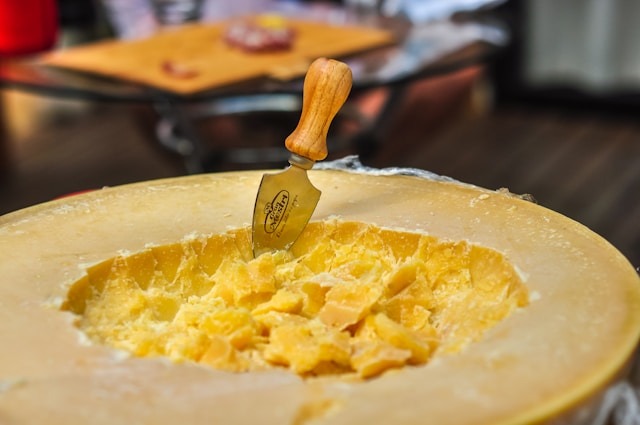Savoring Sardinia’s scandalous specialty, Casu Marzu, isn’t for the faint of heart. You’re venturing into a world where cheese cultivation crosses into controversial territory, teeming with live larvae meant to enhance its flavor. Banned for its bold preparation, this cheese challenges both culinary norms and legal boundaries. It’s not just a test of taste but a question of safety, legality, and tradition, sparking debates among food enthusiasts and regulators alike. As you ponder the peculiarities of Casu Marzu, consider this: what does it say about our limits for adventure on the plate, and are you willing to explore beyond them?
Key Takeaways
- Casu Marzu is a traditional Sardinian cheese, unique for its live fly larvae infestation.
- Despite its rich cultural heritage, the cheese is banned due to health risks, including parasitic infections.
- It remains sought after for its distinctive, pungent flavor and creamy texture, often paired with robust red wine.
- An underground market persists, highlighting the clash between culinary curiosity and legal restrictions.
Origins of Casu Marzu
Casu Marzu, a forbidden delicacy that originated in Sardinia, has its roots deeply embedded in the tradition of using Fiore Sardo cheese. This isn’t just any cheese; it’s a proof of Sardinia’s rich culinary heritage, albeit one that’s wrapped in controversy. The inclusion of live fly larvae in Casu Marzu is what sets it apart—and what led to its ban by EU regulators in 2002. You might wonder why anyone would seek out a cheese that’s basically decomposing, but it’s all about the unique flavors these larvae introduce.
Despite the ban, small farmers in Sardinia haven’t stopped producing Casu Marzu for personal consumption. It’s a bold act of defiance and a nod to tradition, showing just how deep the roots of this cheese go in the local culture. You can’t simply walk into a store and buy it, though; its illegal status means the price fluctuates and it’s sold under the table. This ban, rather than eradicating Casu Marzu, has only fueled its mystique, making it a sought-after delicacy for those in the know.
The Production Process
To create this controversial cheese, sheep milk is first turned into a basic cheese form before being deliberately infested with the larvae of the cheese fly, Piophila casei. This step marks the beginning of a unique production process that transforms ordinary sheep milk cheese into the pungent Casu Marzu.
Here’s how you can understand the transformation:
- Infestation: A female cheese fly deposits over 500 eggs into the cheese. These eggs hatch into larvae, which begin consuming the cheese from the inside out.
- Fermentation: As the larvae eat through the cheese, their digestion process promotes fermentation. This not only alters the cheese’s texture, making it creamy and oozing but also enhances its flavor to create a unique delicacy.
- Critical: The cheese is left to ferment for several weeks, allowing the larvae to thoroughly infuse the cheese with their enzymes. This period of maturation is critical for developing the intense flavors and soft texture that Casu Marzu is renowned for.
This method of production, relying on the larvae of the cheese fly, makes Casu Marzu a standout in the world of cheese. The combination of fermentation and infestation results in a cheese that’s both celebrated and controversial.
Health Risks Involved
You might find the thrill of trying Casu Marzu appealing, but it’s imperative to contemplate the health risks involved. Eating this cheese could expose you to parasitic infections, a serious concern that’s not to be taken lightly. Additionally, there’s a potential for allergic reactions, making it essential to weigh the risks before indulging.
Parasitic Infection Risk
Despite its unique flavor, eating Casu Marzu carries a risk of parasitic infections due to possible bacterial contamination. When you indulge in this Sardinian delicacy, you’re confronting more than just its pungent taste; you’re facing genuine health risks. The presence of live maggots might seem like a sign of freshness and safety, as they’re essential for the cheese’s fermentation process. However, here’s what you need to be mindful of:
- Consumption of dead maggots can lead to severe parasitic infections, highlighting the importance of ensuring the cheese’s maggots are active.
- Health authorities’ warnings stress the potential dangers of ingesting live fly larvae, advocating for avoidance.
- European Union regulations deem Casu Marzu illegal, primarily due to the health hazards associated with consuming live insect larvae.
Allergic Reaction Potential
While considering the parasitic dangers of Casu Marzu, it’s also important to be aware of the potential for allergic reactions, particularly for individuals with sensitivities or specific allergies. Consuming live maggots, a hallmark of this cheese, can trigger allergic reactions. Symptoms might range from itching and swelling to severe difficulty breathing. If you’ve got shellfish allergies, you’re at an even higher risk. The similarity in allergens means that your body might react just as strongly to the maggots as it would to shellfish. Additionally, there’s the grave risk of anaphylaxis, a life-threatening allergic reaction. Health authorities have flagged these risks, advising against Casu Marzu’s consumption due to the significant health hazards it presents.
Legal Battles
Casu Marzu’s journey through the legal system has been fraught with controversy, stemming from health concerns that led to its ban in Italy and several other countries. The European Union’s decision in 2002 to outlaw this cheese, due to hygiene issues arising from its live maggots, marked a significant turning point. Yet, despite these restrictions, an underground market for Casu Marzu has thrived, sustained by those who are undeterred by its illegal status.
Here are three ways to navigate the complex world of Casu Marzu’s legal battles:
- Understand the Reason for the Ban: It’s essential to recognize that the ban is primarily due to health concerns associated with the live maggots present in the cheese.
- Know the Risks: Engaging in the purchase or sale of Casu Marzu could lead to hefty fines, with penalties reaching up to €50,000.
- Appreciate the Craft: Despite its illegal status, small-scale producers in Sardinia continue to make Casu Marzu for personal consumption, maintaining a cultural tradition that predates these legal challenges.
As you explore the world of Casu Marzu, remember that its legal battles are deeply intertwined with concerns over safety and tradition.
The Taste Experience
Shifting focus from its essential challenges, let’s explore the unique taste experience Casu Marzu offers. Imagine biting into a cheese that’s not just cheese but a living, evolving delicacy. This maggot cheese greets your palate with a pungent, salty flavor reminiscent of Gorgonzola, yet it’s the creamy, oozing texture that truly sets it apart. As you savor each bite, you’re not just tasting cheese; you’re experiencing the culmination of a unique fermentation process.
The live maggots within Casu Marzu play a pivotal role in this process, imparting a flavor profile that’s impossible to replicate. Their presence signifies the cheese is at its peak, ready to be enjoyed. However, don’t let your guard down. Consuming Casu Marzu requires protective gear to shield yourself from the larvae. It’s a necessary precaution to fully immerse in this culinary adventure without unwelcome surprises.
Beware, though, that dead maggots signal spoilage and toxicity. This distinction is essential for enjoying Casu Marzu safely. If you encounter cheese where the maggots have ceased to squirm, steer clear. It’s no longer a delicacy but a danger. This balance between exquisite taste and potential hazard makes Casu Marzu a cheese like no other.
Serving Traditions
Diving into the serving traditions of Casu Marzu reveals a rich tapestry of cultural practices steeped in Sardinian heritage. This unique cheese, with its live maggots, is not just a delicacy but an embodiment of the island’s identity. Its consumption is a validation of a way of life that has persisted through generations. Here’s how you can enjoy Casu Marzu, embracing the fullness of its tradition:
- On Moistened Sardinian Flatbread: The cheese is typically served atop a piece of moistened Sardinian flatbread. This pairing is not arbitrary; the flatbread’s texture and taste complement the creamy, pungent cheese, creating a harmonious balance that enhances the overall flavor experience.
- Paired with Cannonau Red Wine: A robust glass of Cannonau red wine is the beverage of choice to accompany Casu Marzu. The wine’s rich, bold flavors stand up to the strong taste of the cheese, making for a perfect pairing that encapsulates the essence of Sardinia’s culinary heritage.
- Embracing the Live Maggots: For an authentic experience, the cheese is often consumed with live maggots. This might challenge your culinary boundaries, but it’s central to the traditional way this cheese is enjoyed on the island. The presence of the maggots is believed to enhance the cheese’s flavor and is a validation of its freshness and authenticity.
Adventurous Consumers
Venturing into the world of Casu Marzu, adventurous consumers find themselves drawn to its unique and often forbidden nature. You’re not just trying a new food; you’re stepping into a domain where few dare to tread. The cheese’s status as a risky endeavor doesn’t deter you; instead, it fuels your curiosity and desire for the exotic. You’re among those who seek out extreme culinary experiences, not just for the taste, but for the thrill it brings.
For you, Casu Marzu isn’t merely a delicacy; it’s a challenge, a proof of your boldness in exploring the unconventional. Its allure lies not just in its flavor, but in its story, wrapped in tradition and controversy. The fact that it’s forbidden in many places only adds to its mystique, making you more keen to experience it.
You’re drawn to Casu Marzu for the adventure it promises, keen to taste what’s considered one of the world’s most daring foods. It’s not just about seeking out something new; it’s about embracing the risk and the exotic, pushing the boundaries of what’s considered acceptable in search of unforgettable experiences.
Global Recognition
As you explore Casu Marzu’s journey, you’ll notice it’s sparked a worldwide culinary curiosity, transcending its origins in Sardinia to become a subject of global fascination. Its international legal status, mired in controversy due to health concerns, contrasts sharply with its cultural heritage recognition in certain circles. This dichotomy adds layers to its allure, inviting you to examine how a forbidden delicacy continues to captivate adventurous palates around the world.
Worldwide Culinary Curiosity
Despite its controversial preparation, Casu Marzu has captured the fascination of food enthusiasts around the globe. This Sardinian cheese, known for being aged with live fly larvae, presents a dangerous allure that hasn’t been deterred by its ban by the European Union in 2002. The intrigue around Casu Marzu and similar maggot-infested cheeses reflects a worldwide culinary curiosity driven by a desire to explore unique and adventurous eating experiences.
Here’s how you can enjoy learning about it:
- Discover the history and tradition behind Casu Marzu in Sardinia.
- Explore other regions’ versions of maggot-aged cheeses, like Egypt’s Mish.
- Understand the risks and regulations surrounding these controversial delicacies, keeping in mind their unique place in culinary history.
International Legal Status
Casu Marzu’s ban within the European Union since 2002 has not dimmed its global appeal among those seeking culinary adventure. Despite being outlawed due to health concerns related to live maggots, the cheese continues to fascinate food enthusiasts worldwide. Small Sardinian farmers still produce Casu Marzu for personal consumption, defying its illegal status. Its dangerous reputation was further cemented when Guinness World Records named it the most dangerous cheese. Yet, you can’t find it in stores. It’s only available through secretive, underground channels, adding to its allure. Casu Marzu’s unique production involving live maggots has garnered international attention, making it a prized delicacy for those daring enough to try.
Cultural Heritage Recognition
Moving beyond its legal controversies, Casu Marzu’s global recognition as a cultural heritage symbol in Sardinia highlights its deep-rooted significance. This forbidden cheese stands as a proof to Sardinian heritage, woven into the fabric of traditional food practices. Despite its ban in many countries, its allure and mystique captivate adventurous eaters worldwide, emphasizing the importance of preserving such unique culinary traditions.
Here’s how you can appreciate Casu Marzu’s cultural heritage:
- Understand its unconventional preparation method, which adds to its international intrigue.
- Recognize its role as a sought-after symbol of Sardinian identity.
- Engage in discussions about the balance between food safety and the preservation of traditional food practices, sparking a broader debate on cultural heritage.
Future of Casu Marzu
Shepherds in Sardinia are hopeful that the future will bring an end to the official restrictions on Casu Marzu, sparking a revival in its production and consumption. With the rising trend of using insect protein in food, there’s a burgeoning optimism that this unique cheese could carve out a niche in the market, overcoming its controversial past.
As you’re diving into the world of Casu Marzu, consider the following table that outlines the potential changes and opportunities for this Sardinian delicacy:
| Aspect | Future Outlook |
|---|---|
| Production | Increase due to easing of restrictions |
| Consumption | Growth as consumer interest in insect protein rises |
| Market Opportunities | Expansion into niche markets with fewer legal hurdles |
| Cultural Acceptance | Broadening as perceptions of insect protein shift |
| Distribution | More official channels opening up for wider availability |
Local gastronomes are buzzing with anticipation for the increased production and availability of Casu Marzu. Despite being banned from traditional sale since 1962, the tide is turning. With a global shift towards more sustainable and diverse protein sources, Casu Marzu’s future looks promising. The cheese, currently available only through specific requests, might soon find its way into more official and widely accessible distribution channels.
Conclusion
So, you’ve journeyed through the world of Casu Marzu, Sardinia’s notorious cheese. You’ve uncovered its origins, how it’s made, and the risks it carries. Despite legal hurdles, its unique taste and serving traditions captivate adventurous eaters worldwide, earning global recognition. As the debate over insect protein in our diets heats up, the future of Casu Marzu hangs in the balance. Will it remain a forbidden pleasure, or could we see its revival in a new culinary era? Only time will tell.




